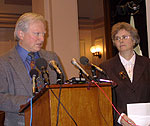House defeats bonding bill
By Laura McCallum
Minnesota Public Radio
March 15, 2002
The Minnesota House rejected an $839 million capital investment bill Thursday night, after funding for the North Star commuter rail line was added to the bill. The speaker of the House says it's possible the House will not pass a bonding bill this session. The vote came hours after the House passed four budget-cutting bills.
| |
|
|
|
||
Funding for commuter rail has deeply divided the House Republican caucus. Supporters of North Star, which would run along existing rail lines between St. Cloud and Minneapolis, say it will reduce congestion in the fastest-growing corridor in the state. Opponents argue commuter rail is not cost-effective, and comes on the heels of the contentious light rail debate.
Once $9 million for North Star was added to the bonding bill, Republicans who oppose the project began trying to use the money for other purposes, ranging from road projects to the Guthrie Theater.
The author of the North Star funding - Rep. Kathy Tinglestad, R-Andover - called the efforts "politics at its worst."
"This is a sham," she said. "All these amendments. Members: we're trying to stay away from bad politics, and I think tonight we're giving bad politics quite a name."
After Tinglestad's emotional speech, House Republicans caucused for an hour. When they returned, most of them voted against the bill, which failed by a vote of 59-68. Bonding bills must be approved by a two-thirds majority, so the vote was not even close to the 81 needed to pass the House.
Republican House Speaker Steve Sviggum of Kenyon says there's a good chance the House won't pass a bonding bill this session. "There's no clear road map to get that magic coalition of 81. We'll let it sit over the weekend. We may let it sit, period," he said.
Majority Leader Tim Pawlenty of Eagan - a Republican candidate for governor - called the defeat a minor setback. He says the House will pass a bonding bill, because of what he describes as the Legislature's intense appetite for capital projects.
The Senate has already passed its capital investment bill, with a total price tag of nearly $1.2 billion. It includes $8 million for the North Star line, while Gov. Ventura recommended $120 million for the project in his bonding proposal.
Sviggum says the House and Senate are at odds on the major issues of bonding and budget. "We've got basically our budget bill advanced, and bills passed - the Senate doesn't. So that's a little bit of a monkey wrench from the Senate standpoint. They've got their bonding bill passed, but not their budget-balancing bills, so we're, ironically, in a flip-flop there," Sviggum said.
Before the bonding bill defeat, the House voted largely along party lines for four bills that would plug most of the remaining $439 million hole in the state budget. The three smaller bills make cuts in solid waste programs, jobs and economic development programs, and family and early childhood education spending.
The biggest cuts are in the health and human services bill, affecting health insurance for children, programs for low-income adults and the state's tobacco endowments.
"It is a tough bill, it does make some tough cuts, and there are some tough choices," said Rep. Kevin Goodno, R-Moorhead, who adds that he was forced to make difficult cuts, because legislators took K-12 and higher education, and nursing home funding off the table. The bill also contains two abortion amendments that could prompt a gubernatorial veto.
The budget-balancing plan moving through the Senate contains no abortion language or spending cuts. It relies on accounting shifts and borrows for transportation projects instead of paying cash.
Senate Democrats say they'll also propose tax increases to address the deficit in the next two-year budget cycle.
Senate tax chairman Larry Pogemiller - a Minneapolis DFLer - says the Senate will likely undo some of the tax cuts of the past few years.
"When revenues were flowing and everything was good, there was kind of this big party where everybody thought that we could just cut all of our taxes and everything would be good. Well, the economy dipped and now I think it's pretty apparent that the property tax cuts and the income tax cuts were more we could afford," Pogemiller said.
Senate and House leaders haven't started negotiating over the budget and bonding yet. Time is running out, if they hope to adjourn by the end of March.
More from MPR
